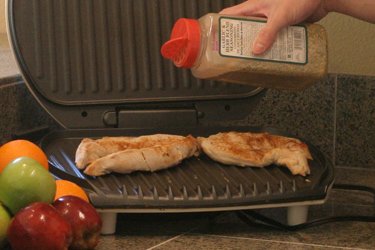I can't seem to lose this last little bit of fat on my midsection? Why can't I grow any muscle no matter how hard I work? Why am I so sore and tired for days after my workouts? I lose weight but I don't see any more definition.
If you have uttered to yourself any or all of these statements, then read up! These are all statements/questions that I hear from people in the gym and people that I encounter all of the time while moving through the world.
I will explain why various protein sources may be the key ingredient to your leaner more defined physique. Man cannot live by fruit, toast, oatmeal, and pasta alone.

 Click Image To Enlarge.
Click Image To Enlarge. Various Protein Sources May Be The Key
Ingredient To Your Leaner More Defined Physique.
Protein Importance
Protein is second to only water as the most abundant nutrient in the human body. All living tissue is made of 22 amino acids, amino acids that are only present in protein.
The amino acids into which proteins are broken down to maintain the health of skin, mouth, eyes, hair; stabilizes appetite; necessary for carbohydrate metabolism; weight control, essential for normal functioning of the heart, nerve tissues, muscles, digestion, learning capacity, replacement of old cells and growth.
These amino acids work to repair muscle tissues and structures that are damaged during life and exercise. Cellular waste if not destroyed causes a bevy of ailments/disease and hinder the bodies metabolic processes.
Waste is escorted by BCAA's (branch chain amino acids found in protein) during immune function, and is later destroyed by antibodies created in the body. Human beings must consume 9 essential amino acids in order to survive. They must be consumed in your diet as they cannot be produced in the body. The remaining 13 are produced in the human body.
You must eat the right protein sources to gain the proper nutrition. Complete proteins contain all 9 of the essential amino acids.
Incomplete proteins come from "plant products", beans, rice, etc. They must be combined in order to supply the body with the 9 essential amino acids it needs. Ladies and gentlemen, now that you see how important consuming protein is let's look at how much should be consume and what types.
How Much Protein
The world health organization and many national health agencies have independently conducted studies, which (even though they differ slightly) all conclude our daily protein requirement should be between 10% to 15% of our daily caloric intake. If you eat 2000 calories a day that equates to 50 to 75 grams of protein.
Protein needs of individuals vary in nature. To estimate your personal protein needs you will need to take your current weight in pounds, divide it in half and then subtract 10. The result is a rough estimate of how much protein you should consume.
If you do not already do so, read food labels, then buy your food uncooked and cook it healthfully. If you do not take anything else from this article that last sentence is paramount.
If your schedule is hectic and you are just too busy and do not have time to eat high protein foods then bars and powders can be substituted. A lot of bars on the market are loaded with other "not so good" man made additives, trans fats, aspartame, saturated fat content (over 3.5g), etc.
If you can't pronounce it, it is not the best thing for you to be eating. The top 3 protein sources that we all know, hear about, and use are whey protein powder, soy protein powder and casein protein powder.
Types Of Protein
Whey Protein Powder
- Made from cows milk
- Separated from casein protein (also in milk)
- Fat and sugar (lactose) mostly removed
- Purity ranks from 70% to 95%, 95% (whey protein isolate)
- #1 most popular protein because of its quick stimulation of protein synthesis (process that leads to muscle growth and strength gains)
- New research shows it aids blood supply to the muscle
- Use 30 minutes before and 30 minutes after workouts.
Soy Protein Powder
- Many benefits similar to whey
- Some studies show it has protection from certain diseases
- Starts with defatted soybeans
- Usually sold from 70% to 90% purity
- Soy protein isolate is the fastest to be absorbed (almost as fast as whey)
- Carbs are extracted
- Soy has superior muscle recovery processes and better antioxidant protection according to the International Journal of Sports Nutrition and Exercise Nutrition
- Increased NO production (nitric oxide) increases blood flow to muscles
- Mix 10 grams soy with 10 grams whey
- Use post workout or use a 10-20 g dosage as a meal replacement
Casein Protein Powder
- 80% of protein in milk
- Sold in 90% purity called micellar casein
- Doesn't mix well
- Digests slowly
- Good between meals and before bed
- Mix 10g casein with 10g of soy and whey post workout
- Take 20 grams before bed to aide your body's recovery and rejuvenation period during sleep

